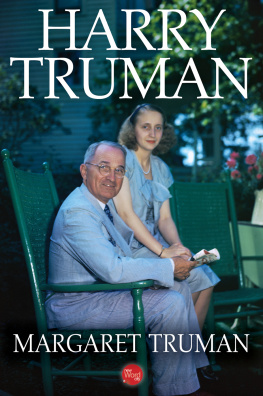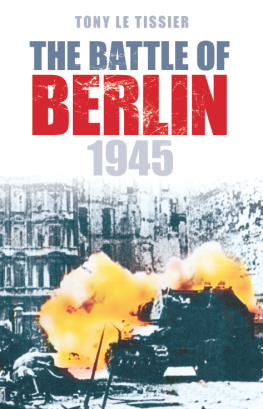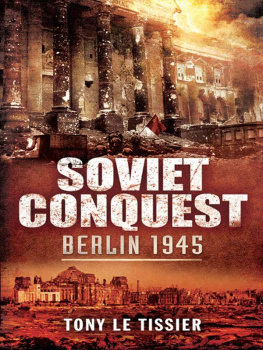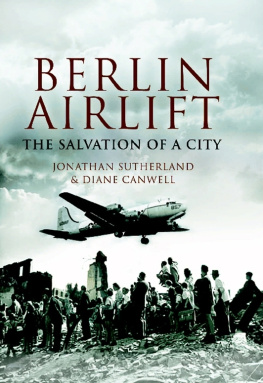
A LSO BY R ICHARD R EEVES
President Reagan:
The Triumph of Imagination
President Nixon:
Alone in the White House
President Kennedy: Profile of Power
A Force of Nature:
The Frontier Genius of Ernest Rutherford
Running in Place:
How Bill Clinton Disappointed America
The Reagan Detour
What the People Know: Freedom and the Press
Passage to Peshawar:
Pakistan Between the Hindu Kush and the Arabian Sea
American Journey:
Traveling with Tocqueville in Search of Democracy in America
Jet Lag:
The Running Commentary of a Bicoastal Reporter
Convention
Old Faces of 1976
A Ford, Not a Lincoln
DARING YOUNG MEN
T HE H EROISM AND T RIUMPH OF THE
B ERLIN A IRLIFT , J UNE 1948M AY 1949
RICHARD REEVES
S IMON & S CHUSTER
New York London Toronto Sydney

Simon & Schuster
1230 Avenue of the Americas
New York, NY 10020
www.SimonandSchuster.com
Copyright 2010 by Reeves-ONeill, Inc.
All rights reserved, including the right to reproduce this book or portions thereof in any form whatsoever. For information address Simon & Schuster Subsidiary Rights Department, 1230 Avenue of the Americas, New York, NY 10020
First Simon & Schuster hardcover edition January 2010
SIMON & SCHUSTER and colophon are registered trademarks of Simon & Schuster, Inc.
For information about special discounts for bulk purchases, please contact Simon & Schuster Special Sales at 1-866-506-1949 or business@simonandschuster.com.
The Simon & Schuster Speakers Bureau can bring authors to your live event. For more information or to book an event contact the Simon & Schuster Speakers Bureau at 1-866-248-3049 or visit our website at www.simonspeakers.com .
Designed by Kyoko Watanabe
Manufactured in the United States of America
1 3 5 7 9 10 8 6 4 2
Library of Congress Cataloging-in-Publication Data Reeves, Richard, 1936
Daring young men : the heroism and triumph of the Berlin Airlift, June 1948May 1949 / Richard Reeves. 1st Simon & Schuster hardcover ed.
p. cm.
Includes bibliographical references and index.
1. Berlin (Germany)HistoryBlockade, 19481949. 2. Air pilots, MilitaryUnited StatesHistory20th century. 3. Air pilots, MilitaryGreat BritainHistory20th century. I. Title.
DD881.R435 2010
943.1550874dc22
2009015333
ISBN 978-1-4165-4119-6 (hardcover)
ISBN 978-1-4391-9984-8 (eBook)
Photography Credits: U.S. Army Signal Corps, Courtesy of Harry S. Truman Library: 1; Keystone Pressedienst: 2; Walter Sanders / Time & Life Pictures / Getty Images: 3; National Museum of the U.S. Air Force: 4, 8; Wikimedia Commons: 5; Archiv der sozialen Demokratie der Friedrich-Ebert-Stiftung: 6; The New York Times / Redux Pictures: 7; Courtesy Kenneth Hawk Slaker: 9, 10; Courtesy William Lafferty: 11; Courtesy Noah Thompson: 12; dpaFotoreport: 13; Landesarchive Berlin: 14, 20, 21, 22, 24; Courtesy Guy Dunn: 15; Courtesy Edwin Gere: 16; Courtesy Kurt Dettmer: 17; Courtesy Gerhard Noack: 18; Popperfoto / Getty Images: 19; Charles Fenno Jacobs / Hulton Archive / Getty Images: 23
This book is for Jeffrey Reeves,
who is just a great guyand my son.
CONTENTS
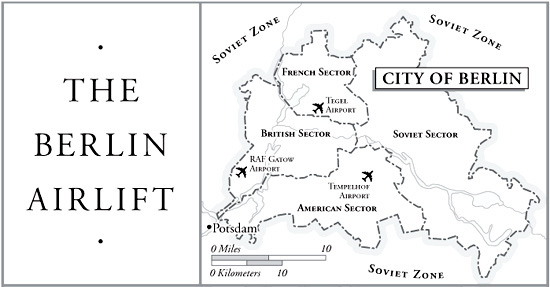
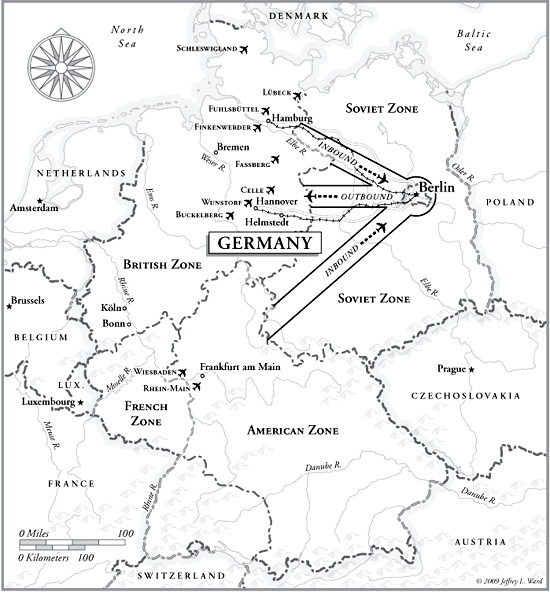
INTRODUCTION
Lets make a joint effort, perhaps we can kick them out.
Soviet Premier Joseph Stalin to Wilhelm Pieck, Communist Party leader of East Germany, March 19, 1948
We stay in Berlin. Period.
President Harry S. Truman on June 29, 1948, after his military and diplomatic advisors told him there was no way for a few thousand Allied soldiers to stand up to hundreds of thousands of Red Army troops blockading the city
It was great fun, we were all together again doing an important job.... Youd be talking to some fellow and find out he had been a lawyer in Manhattan a couple of weeks before.
Royal Air Force Flight Lieutenant John Curtis, later Air Marshal Sir John Curtis
T EMPELHOF AIRPORT IS QUIET NOW, BEING TURNED INTO A giant park by the Berlin City Council. But there was a time sixty years ago when it was never silent, in 1948 and 1949, when American and British planes landed or took off every forty-five seconds to keep Berlin and Berliners alive.
It is an extraordinary place still, a grassy bowl enclosed on one side by a C-shaped building three-quarters of a mile long, once the largest structure in the world, a looming artifact of Hitlers architectural ambitions. In the silence, it is not hard to imagine the sights and sounds of history, the gigantic swastika flags that hung from the main terminals sixty-foot-high ceilings and then the planes roaring in and out only three years after the end of World War II.
The far side of the greensward is bordered by a chain-link fence just in front of six-story apartment buildings and a cemetery. A United States Air Force C-54 is on a pedestal with a plaque that reads:
For 467 days during 1948 and 1949, the City of Berlin was kept alive by an Airbridge of Allied Aircraft bringing food and other essentials from the West. This C-54 Skymaster actually flew during the Airlift and was last flown into the city in 1971 by Colonel Gail Halvorsen, the Candy Bomber. The Airlift, called Operation Vittles by the Americans, was the result of a Soviet blockade of all land, rail, and water routes into the city.
I was eleven years old when the airlift began, as thrilled by the action as only a small boy could be. I thought I was on those planes far away, riding to the rescue of innocent people. Of course, Berliners were not that innocent, but that just made the effort more heroic to an American kid, particularly one who wanted to be a pilot.
I was different more than a half-century later and so was my country. The United States was becoming or being seen as arrogant, self-righteous, brutal, even a monster using our very substantial power to try to enforce a new order, a kind of global neo-imperialism. Of course, we meant wellinnocents abroadAmericans usually do. After all, dont all people want to be like us?
It seemed some didnt. I have traveled enough and lived in enough places to feel the resentment, even hatred, of people who had been told America was the height of disinterested goodas long as things were done our way. I was taken by a line in a not-very-good 2003 movie, Head of State, in which a young black Washington city councilman is running for president against a self-satisfied senator who ends each speech by saying, God bless America. And no one else!
Was that the America I grew up in? That was my state of mind when I picked up Tony Judts excellent book Postwar, which is subtitled A History of Europe Since 1945, published in 2005. On page 146, I read this:
As the Soviet troops tightened their control over surface connections into the city, the American and British governments decided upon an airlift to provision their own zones and on June 26 the first transport plane landed at Tempelhof airfield in West (Berlin).
The Berlin airlift lasted until May 12th 1949. Over those eleven months the Western allies shipped some 2.3 million tons of food on 277,500 flights, at the cost of the lives of 73 Allied airmen. Stalins purpose in blockading Berlin was to force the West to choose between quitting the city ... or else abandoning their plans for a separate West German state ... in the end he secured neither objective.
Next page


